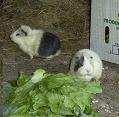 |
Bungala Ridge Permaculture Gardens REDUCE ... REUSE ... RECYCLE ... REPAIR ... RETURN ... REVEGETATE ... REPLENISH |
||||||||
|
|||||||||
|
|
First Steps to Permaculture
The best way to get involved in permaculture is to start simple. Do something now. But remember to start small and let your actions grow naturally and surely! Even if you live in a small rented flat you can start living your permaculture lifestyle! Give up feeling paralysed by unachievable dreams, give up the despair and apathy that permeates every level of our society. Begin by responding to the particular circumstances in which you find yourself, find yourself a simple, small, achievable project and get started! How about these for starters? Grow your own food - you can start small with sprouts on the window sill, or pot up some herbs for the verandah, perhaps grow a tomato or two in a pot. Begin small, with only a square metre of ground or a few pots until you begin to feel confident and experience some success. Grow those foods you like - perhaps some chillis to preserve, or a lemon tree for fresh lemonade in summer! Potatoes and lettuce are two easy staples that never let you down. Keep some animals - many areas won't allow chickens, but what about guinea pigs? They don't take up much space, make great pets and they're great at turning all your vegie scraps into composted pellets, ideal for those potted tomatoes! How about a water garden? Even a bucket is big enough to grow a crop of water chestnuts. Grow a clump of lemon grass beside a small bog pond - great for impromptu Thai meals. If you have the room, go for a bigger pond and investigate more edible water plants. And while you're at it, how about putting up a bird bath or a water feature to cool the garden. Bog and water ponds gardens are great at encouraging frogs, but make sure they're child safe. All too often we find that we have much more than we need - why not share any surplus with neighbours and friends? It could be anything - fruit, vegetables, recycled materials, books, old clothes, things we don't need any more or can't remember why we got them in the first place. Reduce the need for manufacturing and keep things circulating - it all helps the planet. We all use energy - some more than others. Develop an energy conscious way of thinking . We consider all of our actions in terms of total energy in and out and work to develop efficiency at all times. How about these for starters:
Instead of vegetating in front of passive entertainment devices such as computer/video games or television on those long summer evenings, get involved in your local community - tune into the neighbourhood by walking, talking and participating in activities; network with like-minded people and organisations. Probably the most important way you can begin to act as a permaculturalist is to avoid waste - consume less and become a more aware consumer. Ask yourself - "do I really need this", even if you really want it. Ask yourself, "do I already have something that would do the job just as well?" Look to recycle, before jumping in the car and heading down the superstores.. Make compost from household "waste". Find ways of recycling rainwater and greywater waste (e.g. installing a rainwater tank). Look for simple, easy ways to do this - all too often the technological fix or whiz bang gadget isn't anywhere as efficient as the old fashioned, human centred solution! Remember to be healthy - prepare and cook healthy food, exercise daily and get enough rest. And don't forget - laughter is the best medicine! Return to What is Permaculture
|
Hot Links!
This site is sponsored by
|
|||||||
|
|
|
|
|||||||




